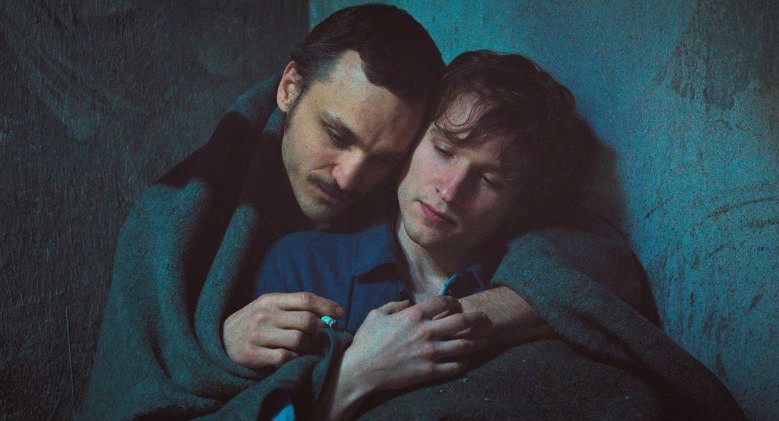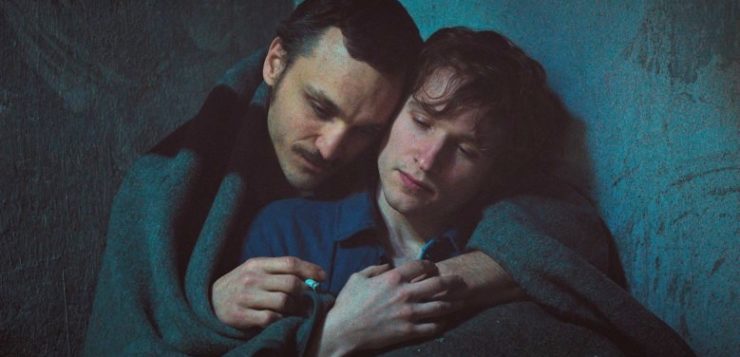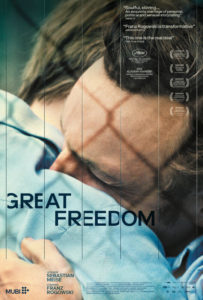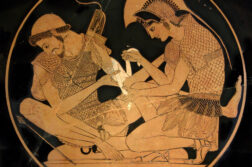Great Freedom
Sebastian Miese, dir. & writer
March 4 release in US
DIRECTOR SEBASTIAN MIESE’S Great Freedom was discovered in France at the 2021 Cannes Film Festival, where it won the Jury Prize in the festival’s side competition for emerging filmmakers known as Un Certain Regard. One of its two stars, the oddly handsome Franz Rogowski, has already made a name for himself in the German films Undine and Transit, and he won a few best actor awards for his work in Great Freedom. His costar, Georg Friedrich, has appeared in some eighty films since 1984, and in 2017 he won the award for Best Actor at the Berlin Film Festival.
The success of Great Freedom depends almost entirely on its two leads, who play a pair of prison inmates who cross paths repeatedly over the years between 1945 and 1969. We’re first introduced to Hans, played by Rogowski, who frequents public toilets looking for hookups. On his most recent arrest and incarceration, in 1968, we discover that he’s an unrepentant recidivist. An older cellmate, Viktor, played by Friedrich, welcomes back his younger companion with a certain familiarity and good humor. A bawdy reference to a gay act suggests that intimacy between the men was previously established, though it hardly confirms that Viktor is gay. This history is established in flashbacks—to the immediate aftermath of Germany’s defeat in World War II, to West Germany during the Cold War in the 1950s, and to the worldwide youth and sexual revolutions of the late 1960s—which bring the back story of Hans and Victor’s relationship into focus.

The film’s early scenes are set in the “present”—1968—so we learn from the first flashback that Hans and Viktor’s 1945 meeting was a clash of opposites. Young, dour Hans is reserved and alert to understanding prison culture, while Viktor, a jaded veteran of the war, is revolted by the thought of sharing his cell with a “pervert.” He forcibly ejects Hans from the cell, hurling invectives at him, but a prison guard’s intervention makes clear to Viktor that he doesn’t have a choice in the matter. We also learn that American soldiers are stationed in the prison, enforcing the rules of the victorious Allies, now engaged in de-Nazifying an entire country.
Soon enough, the two men establish a wary coexistence. When Viktor sees concentration camp numbers tattooed on Hans’ forearm, he commiserates with his young cellmate over the injustice of his having been incarcerated for being gay and then moved directly from concentration camp to jail after the war, trapped by West Germany’s continued adherence to the notorious Paragraph 175. Viktor offers to turn the tattoo into a vague animal shape that will hide its origins. The scene of Viktor poking at Hans’ forearm using impromptu components of the tattoo trade provokes our unease as the needle and “ink” repeatedly prick Hans’ pale skin. Nevertheless, it also reveals a strange tenderness as the burly Viktor takes care to refashion the numbers into something like art, wiping off any excess “ink” with his thick fingers—a rare moment of physical intimacy. After all, Viktor had earlier warned Hans never to touch him.
As the film alternates between the three time periods, we see Hans age into resignation. He accepts his lot as a lost soul repeatedly confined to prison for the crime of seeking sex with men in tawdry public places. There’s no evidence of any family ties, nor of any long-term relationships in his past. Yet his essential decency is confirmed when in 1968 he befriends a young inmate, Leo (the lovely Anton von Lucke), who was his hookup at the site of his last arrest. Learning that the angel-faced young man was a teacher of German and music, Hans confirms to the authorities the fiction that Leo devised in his own defense—that he had been forced to submit to Hans’ “assault.” This gesture by Hans leads to Leo’s early release and the chance to have his record expunged so that he can continue his career. Hans explains his self-sacrifice to Leo: “With me it doesn’t matter. You’re a teacher.”
The film is episodic, but each scene deepens our understanding of Hans’ emotional and verbal restraint, which hides reserves of deep feeling. Rogowski’s quiet performance as he intently observes those around him while trying to hold on to some core of decency is reminiscent of actors like Montgomery Clift or Marlon Brando. His lovely if wounded face registers wondrous shades of feeling and intelligence. Older and more volatile, Viktor, in the equally thoughtful performance of Georg Friedrich, shifts from being a cardboard homophobe to a man who comes to a grudging respect for his gay cellmate.
Although the film’s dialogue is spare, credit still goes to co-screenwriters Sebastian Meise and Thomas Reider. Talk may be minimal, but every word is made to count. Incidents inside the prison are rendered with raw but understated verisimilitude. The punishment of solitary confinement—the prisoner nearly naked, held in a darkened cell, left with a bucket for collecting his own urine and feces—challenges Hans’ physical and mental stamina on several occasions. Rogowski is said to have undergone several fluctuations in weight during the shoot. He is also a dancer and uses his slender yet defined body to become, as necessary, an almost spectral figure. At moments, with his large, sympathetic eyes and gentle smile, Rogowski’s Hans has the demeanor of a spiritual guide or shaman.
The film ends in 1969, by which time West Germany has modified Paragraph 175 to allow homosexual acts between men aged 21 and over (though the specifics of this change are not explained in the film). With the completion of his latest prison sentence, Hans is free to explore the new, openly gay nightlife, but it’s not clear whether he’ll be able to make a fresh adjustment. The movie ends for Hans less on a hopeful note than one of resignation. In this thoughtful double character study, and in the film’s examination of the personal costs of a draconian penal system, Great Freedom delivers not a neat Hollywood ending but a painful reflection on how an unyielding social order thwarts the human spirit.
Allen Ellenzweig, a longtime contributor to this magazine, is a cultural writer based in New York City.








Discussion1 Comment
Poignant review; the last 8 words deserve broadest of recognition and acclaim, hopefully leading to rectification.